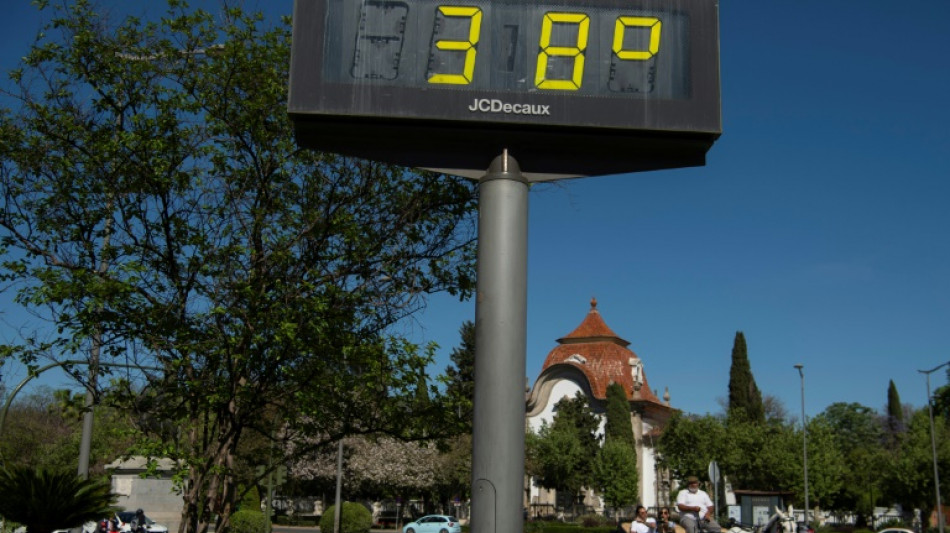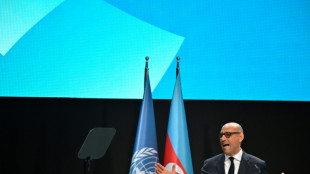
-
 Shiffrin wins Levi slalom for 98th World Cup victory
Shiffrin wins Levi slalom for 98th World Cup victory
-
Israel pummels south Beirut as Lebanon mulls truce plan

-
 Religious Jews comfort hostages' families in Tel Aviv
Religious Jews comfort hostages' families in Tel Aviv
-
German Greens' Robert Habeck to lead bruised party into elections

-
 Johnson bags five as Australia beat Pakistan to seal T20 series
Johnson bags five as Australia beat Pakistan to seal T20 series
-
Zelensky says wants to end war by diplomacy next year

-
 Rugby Union: Wales v Australia - three talking points
Rugby Union: Wales v Australia - three talking points
-
10 newborns killed in India hospital fire

-
 Veteran Le Cam leads Vendee Globe as Sorel is first to quit
Veteran Le Cam leads Vendee Globe as Sorel is first to quit
-
Bagnaia on pole for Barcelona MotoGP, Martin fourth

-
 UN climate chief urges G20 to spur tense COP29 negotiations
UN climate chief urges G20 to spur tense COP29 negotiations
-
Rauf takes four as Pakistan hold Australia to 147-9 in 2nd T20

-
 World not listening to us, laments Kenyan climate scientist at COP29
World not listening to us, laments Kenyan climate scientist at COP29
-
Philippines warns of 'potentially catastrophic' Super Typhoon Man-yi

-
 Wales take on Australia desperate for victory to avoid unwanted record
Wales take on Australia desperate for victory to avoid unwanted record
-
Tyson beaten by Youtuber Paul in heavyweight return

-
 Taylor holds off bloodied Serrano to retain undisputed crown
Taylor holds off bloodied Serrano to retain undisputed crown
-
Japan PM expresses concern to Xi over South China Sea situation

-
 Tens of thousands flee as Super Typhoon Man-yi nears Philippines
Tens of thousands flee as Super Typhoon Man-yi nears Philippines
-
Hoilett gives Canada win in Suriname as Mexico lose to Honduras

-
 Davis, James spark Lakers over Spurs while Cavs stay perfect
Davis, James spark Lakers over Spurs while Cavs stay perfect
-
Mushroom houses for Gaza? Arab designers offer home-grown innovations

-
 Gabon votes on new constitution hailed by junta as 'turning point'
Gabon votes on new constitution hailed by junta as 'turning point'
-
Young Libyans gear up for their first ever election

-
 Vice tightens around remaining civilians in eastern Ukraine
Vice tightens around remaining civilians in eastern Ukraine
-
Dutch coalition survives political turmoil after minister's resignation

-
 Uruguay end winless run with dramatic late win over Colombia
Uruguay end winless run with dramatic late win over Colombia
-
Max potential: 10 years since a teenage Verstappen wowed in Macau

-
 Tens of thousands flee as Typhoon Man-yi nears Philippines
Tens of thousands flee as Typhoon Man-yi nears Philippines
-
Is Argentina's Milei on brink of leaving Paris climate accord?

-
 Big Bang: Trump and Musk could redefine US space strategy
Big Bang: Trump and Musk could redefine US space strategy
-
Revolution over but more protests than ever in Bangladesh

-
 Minister resigns but Dutch coalition remains in place
Minister resigns but Dutch coalition remains in place
-
Ireland won 'ugly', says relieved Farrell

-
 Stirring 'haka' dance disrupts New Zealand's parliament
Stirring 'haka' dance disrupts New Zealand's parliament
-
England's Hull grabs lead over No.1 Korda at LPGA Annika

-
 Kosovo players walk off in Romania after 'Serbia' chants, game abandoned
Kosovo players walk off in Romania after 'Serbia' chants, game abandoned
-
Kosovo players walk off in Romania game after 'Serbia' chants

-
 Lame-duck Biden tries to reassure allies as Trump looms
Lame-duck Biden tries to reassure allies as Trump looms
-
Nervy Irish edge Argentina in Test nailbiter

-
 Ronaldo at double as Portugal reach Nations League quarters, Spain win
Ronaldo at double as Portugal reach Nations League quarters, Spain win
-
Fitch upgrades Argentina debt rating amid economic pain

-
 Trump picks Doug Burgum as energy czar in new administration
Trump picks Doug Burgum as energy czar in new administration
-
Phone documentary details struggles of Afghan women under Taliban

-
 Ronaldo shines as Portugal rout Poland to reach Nations League last-eight
Ronaldo shines as Portugal rout Poland to reach Nations League last-eight
-
Spain beat Denmark to seal Nations League group win

-
 Former AFCON champions Ghana bow out as minnows Comoros qualify
Former AFCON champions Ghana bow out as minnows Comoros qualify
-
Poland, Britain reach BJK Cup quarter-finals

-
 At summit under Trump shadow, Xi and Biden signal turbulence ahead
At summit under Trump shadow, Xi and Biden signal turbulence ahead
-
Lebanon said studying US truce plan for Israel-Hezbollah war


Europe is world's fastest warming continent: climate report
Europe should brace for more deadly heatwaves driven by climate change, said a sweeping report on Monday, noting the world's fastest-warming continent was some 2.3 degrees Celsius hotter last year than in pre-industrial times.
Crop-withering drought, record sea-surface temperatures and unprecedented glacier melt are among the consequences laid out in a report by the World Meteorological Organization and the European Union's Copernicus Climate Change Service.
The continent, which has been warming twice the global average since the 1980s, saw its warmest summer on record last year, with countries including France, Germany, Italy, Portugal, Spain and the United Kingdom experiencing their warmest year on record.
The world has warmed an average of nearly 1.2C since the mid-1800s, unleashing a devastating cascade of extreme weather, including more intense heatwaves, more severe droughts in some areas and storms made more ferocious by rising seas.
Hardest hit are the most vulnerable people and the world's poorest countries, who have done little to contribute to the fossil fuel emissions that drive up temperatures.
But impacts are becoming increasingly severe across the world, with regions in the northern hemisphere and around the poles seeing particularly rapid warming.
In Europe, the high temperatures "exacerbated the severe and widespread drought conditions, fuelled violent wildfires that resulted in the second largest burnt area on record, and led to thousands of heat-associated excess deaths," said WMO Secretary-General Petteri Taalas.
Temperatures across the continent rose 1.5C in 30 years, from 1991 to 2021, according to the report, the State of the Climate in Europe 2022.
Severe heat left more than 16,000 people dead last year, the report said, while floods and storms accounted for most of the $2 billion in damages from weather and climate extremes.
"Unfortunately, this cannot be considered a one-off occurrence or an oddity of the climate," said Copernicus Director Carlo Buontempo in the report.
"Our current understanding of the climate system and its evolution informs us that these kinds of events are part of a pattern that will make heat stress extremes more frequent and more intense across the region."
- Renewable hopes -
Increasing temperatures have taken a toll on economies and ecosystems, the report said.
In the Alps, glaciers saw a new record mass loss for a single year in 2022, caused by very low winter levels of snow, a hot summer as well as deposits of wind-blown Saharan dust.
The story was similar in the oceans, with average sea surface temperatures in the North Atlantic the hottest on record, with warming rates in the eastern Mediterranean Sea, the Baltic and Black Seas and the southern Arctic more than three times the global average.
Marine heat waves -- which can displace or even kill species -- also lasted for up to five months in several regions including the western Mediterranean Sea, English Channel and southern Arctic.
Rainfall was below normal across much of the continent, hitting agricultural production and water reserves while creating the conditions for wildfires.
The year saw the second largest burnt area in the region on record, with large fires scorching across parts of France, Spain, Portugal, Slovenia and the Czech Republic.
The Spanish water reserve decreased to less than half of capacity by July as the Iberian Peninsula saw its fourth drier-than-average year in a row in 2022.
Farmers could not irrigate their fields in parts of France, while the dry conditions hit harvests for cereals and grapes in Germany.
The drought also affected energy production, leading to reductions in hydroelectric power as well as output from some nuclear power stations which rely on water supplies for cooling.
But, in one positive sign for the future, the report noted that wind and solar power generated 22.3 percent of European Union electricity in 2022, overtaking fossil gas (20 percent) for the first time.
The report said this was due to a combination of factors, including a "significant increase" in installed solar power last year.
"Solar and wind tend to complement each other throughout the year: solar radiation is higher in late spring and summer while wind intensity is usually higher in winter," the report said.
While there has been no significant trend in wind or rain patterns in Europe over the last 30 years, the report said there was a marked increase in sunlight, with 2022 seeing the highest amount of solar radiation since records began in 1983.
J.Bergmann--BTB
